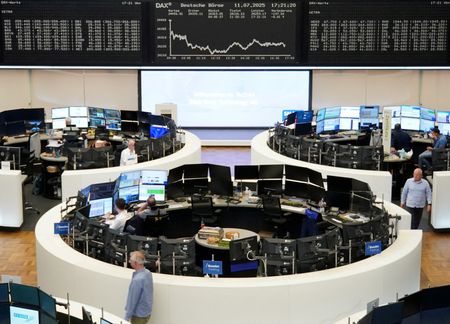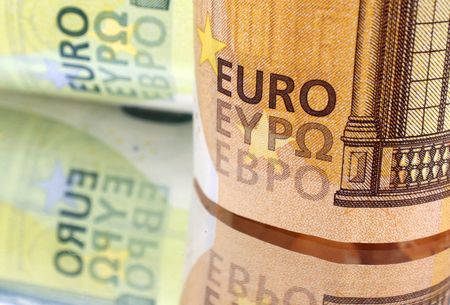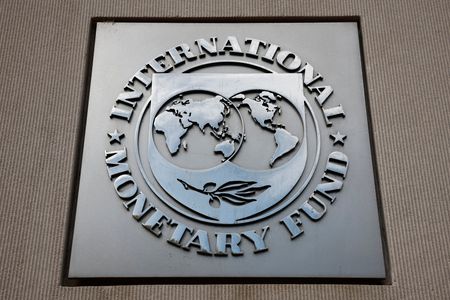By Sinéad Carew and Marc Jones
NEW YORK, LONDON (Reuters) -Wall Street equities rose slightly while European stock indexes turned lower and the euro took a tumble on Monday as investors greeted a trade agreement between the U.S. and European Union with cautious relief at the start of an action-packed week for markets.
The weekend’s framework trade deal, which European Commission President Ursula von der Leyen described as the best the bloc could get, will impose a 15% import tariff on most EU goods and see the EU spend $600 billion on U.S. investments while opening up some important parts of its market.
While the accord may avert a damaging standoff between the trading partners, which account for almost a third of global trade, some European capitals complained it was lopsided in favor of Washington.
Monday’s modest equity reaction followed a series of record highs for the S&P 500 and Nasdaq, thanks to solid quarterly earnings so far, bets on megacaps and artificial intelligence stocks as well as optimism that the U.S. would ultimately reach agreements with its trading partners.
The removal of uncertainty for the U.S.-EU relationship was a relief for investors, according to Phil Orlando, chief market strategist at Federated Hermes, who saw the 15% tariff as a lot better than “some of the ridiculous numbers that were being thrown around back in the first week in April.”
“You’ve got some certainty going forward, and you’ve got numbers that seem reasonable,” said Orlando, while noting that Monday’s modest reaction made sense after recent gains and ahead of a big week for economic releases, major earnings reports and a U.S. Federal Reserve meeting.
Orlando said that at this point he would not be “throwing massive amounts of money” into a market where the S&P 500 has risen 32% since its April lows.
“Our view is that you need to be patient. You absolutely could have a little bit of a hiccup here, consolidation and some digestion. We still think the market is going to work higher, longer term,” he said.
This week traders are waiting for interest rate decisions from the U.S. Federal Reserve and the Bank of Japan, the monthly U.S. non-farm payrolls report, and earnings from megacap companies Apple, Microsoft and Amazon.
The Fed has been cautious on any rate cuts as officials have said they want to determine the impact of tariffs on inflation before they ease rates further. But the Fed’s stance has led to tensions with the White House with President Donald Trump repeatedly lashing out at Fed Chair Jerome Powell for not cutting rates.
On Wall Street at 11:03 a.m. the Dow Jones Industrial Average fell 8.27 points, or 0.02%, to 44,894.24, the S&P 500 rose 4.91 points, or 0.08%, to 6,393.48 and the Nasdaq Composite rose 62.76 points, or 0.30%, to 21,170.54.
MSCI’s gauge of stocks across the globe fell 1.79 points, or 0.19%, to 939.47.
The pan-European STOXX 600 index fell 0.27%, while Europe’s broad FTSEurofirst 300 index fell 5.16 points, or 0.24%
And meanwhile, other countries are still scrambling to make deals ahead of Trump’s August 1 deadline. Europe’s deal follows U.S. pacts with Japan, Indonesia and the Philippines made last week. But talks between the U.S. and China in Stockholm on Monday are expected to lead to the two sides extending their trade truce for another 90 days.
In currencies, the dollar rose against major currencies after the weekend’s trade pact, with investors also looking to this week’s U.S. and Japanese central bank meetings.
The dollar index, which measures the greenback against a basket of currencies including the yen and the euro, rose 0.75% to 98.33.
The euro was down 0.92% at $1.1632 while against the Japanese yen, the dollar strengthened 0.43% to 148.3.
Apolline Menut at fund manager Carmignac meanwhile called it a win for the U.S., given the forced purchases of U.S. energy and military equipment and zero tariff retaliation by Europe.
“This isn’t a trade breakthrough – it’s damage control for the sake of diplomatic pragmatism,” she said. “The economic cost may sting, but the strategic calculus is brutally rational.”
In Treasuries, the yield on benchmark U.S. 10-year notes rose 2.6 basis points to 4.412%, from 4.386% late on Friday while the 30-year bond yield rose 2.4 basis points to 4.9533%.
The 2-year note yield, which typically moves in step with interest rate expectations for the Federal Reserve, rose 1.7 basis points to 3.934%, from 3.917% late on Friday.
In energy markets, oil prices rose after the U.S.-EU deal and Trump’s announcement he would shorten the deadline set for Russia to end its war in Ukraine or face severe tariffs.
U.S. crude rose 1.86% to $66.36 a barrel and Brent rose to $69.68 per barrel, up 1.81% on the day.
In precious metals, gold fell to a near three-week low as the trade accord lifted the dollar and risk sentiment, while investors awaited fresh cues on rate policy from this week’s Federal Reserve meeting.
Spot gold fell 0.83% to $3,308.34 an ounce. U.S. gold futures fell 0.25% to $3,325.50 an ounce.
(Reporting by Sinéad Carew in New York, Marc Jones in London, Ankur Banerjee and Gregor Stuart Hunter in Singapore; Editing by Joe Bavier, Jan Harvey and Giles Elgood)








